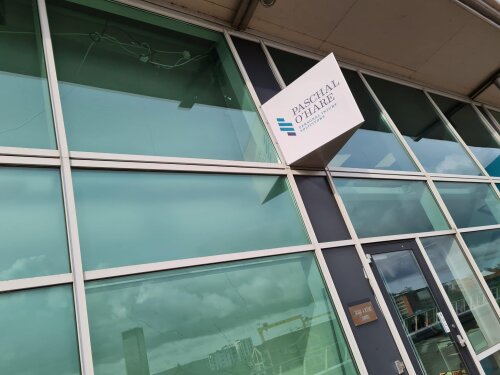Best Commercial Litigation Lawyers in Belfast
Share your needs with us, get contacted by law firms.
Free. Takes 2 min.
List of the best lawyers in Belfast, United Kingdom
About Commercial Litigation Law in Belfast, United Kingdom
Commercial litigation covers civil disputes arising out of business and commercial relationships. In Belfast, Northern Ireland, commercial litigation can include contract disputes between companies, shareholder and partnership disputes, insolvency and restructuring matters, debt recovery, construction and engineering disputes, professional negligence claims, intellectual property disputes, and injunctions or other urgent remedies. Cases are usually handled in the local county courts for lower value matters or in the High Court in Belfast for higher value or more complex cases. Parties can also pursue alternative dispute resolution - such as mediation or arbitration - which are commonly used to resolve commercial disputes without a full trial.
Why You May Need a Lawyer
Commercial disputes often involve complex facts, significant sums of money, tight time limits, technical legal arguments and strategic choices that affect your business operations. You may need a lawyer if you face any of the following situations:
- A counterparty has materially breached a contract and you need to recover losses or enforce performance.
- A creditor demands payment, or you need to pursue debt recovery through the courts.
- There is a shareholder dispute, deadlock in company management, or allegations of unfair prejudice.
- Your business is subject to insolvency proceedings, or you need to commence winding-up or restructuring steps.
- You need urgent interim relief, such as an injunction or a freezing order, to protect assets or stop harmful conduct.
- A supplier, customer or contractor alleges negligence or breach and seeks significant damages.
- You are considering or responding to arbitration, adjudication, or other ADR processes and require legal advice or representation.
Engaging a solicitor early can preserve evidence, ensure compliance with procedural rules, manage costs and settlement strategy, and improve the chances of a favourable outcome.
Local Laws Overview
Some key legal and procedural points to be aware of when pursuing or defending commercial litigation in Belfast are:
- Court structure - Commercial disputes in Northern Ireland are heard in the County Courts for lower value cases and in the High Court in Belfast for higher value or complex matters. Appeals are dealt with by the Court of Appeal in Northern Ireland, and in limited circumstances by the UK Supreme Court.
- Civil procedure - Cases are governed by the Civil Procedure Rules for Northern Ireland and associated practice directions. These rules set out pre-action expectations, how claims are started and defended, timetables for disclosure and witness evidence, and the management of trials.
- Limitation periods - Statutory time limits apply to bringing claims. For many contract and tort claims the limitation period is typically six years from the date of breach or loss. Some claims have shorter or longer periods - act promptly and check the relevant limitation rules for your case.
- Interim remedies - Courts can grant urgent relief such as interim injunctions, freezing orders to restrain disposal of assets, and orders for disclosure or preservation. These remedies have strict procedural and evidential thresholds and may require immediate legal steps.
- Costs - The general rule in civil litigation is that the losing party may be ordered to pay the winner's costs, but recovery is not automatic and is subject to detailed assessment. Settlement offers and conduct during litigation affect costs awards.
- Alternative dispute resolution - Mediation, arbitration, adjudication and expert determination are commonly used in commercial disputes. Arbitration is private and final except for limited court intervention, while mediation aims to secure negotiated settlement without a judgment.
- Enforcement - Winning a judgment is only part of the process. Enforcement tools include writs of control, charging orders, third-party debt orders and other remedies to recover or secure sums owed.
- Specialist rules - Specific industries have tailored procedures and statutory frameworks, for example construction disputes may involve statutory adjudication or contract-based dispute resolution clauses, and insolvency disputes follow insolvency law and procedures.
Frequently Asked Questions
What is the typical process for starting a commercial claim in Belfast?
You usually start by sending a letter before action that sets out the dispute and invites settlement. If no resolution is reached, you issue a claim form in the appropriate court - county court for lower value matters or the High Court for more substantial or complex claims. After the claim is served, the defendant files a defence and the case proceeds through directions hearings, disclosure of documents, witness evidence, and finally trial unless settled earlier.
How long will a commercial dispute take to resolve?
Timelines vary widely. Simple cases may settle within a few months. Complex High Court litigation can run for a year or more up to trial, and appeals add additional months. Time can be reduced by using ADR such as mediation or by agreeing a streamlined timetable with the court. Early legal advice can shorten the process and avoid unnecessary delay.
Can I use mediation or arbitration instead of going to court?
Yes. Mediation and arbitration are commonly used in commercial disputes. Mediation is voluntary and focuses on negotiated settlement. Arbitration provides a binding private determination and can be faster and more confidential than court litigation. Many commercial contracts include dispute resolution clauses that require ADR before court proceedings. Seek legal advice on the best route given the nature of your dispute, confidentiality concerns and enforcement needs.
What are interim injunctions and when are they used?
Interim injunctions are court orders granting temporary relief pending final determination - for example, to stop a party from selling assets, to prevent a breach of contract, or to preserve evidence. The court considers factors such as whether there is a serious issue to be tried, whether damages would be an adequate remedy, and the balance of convenience. Urgent applications often require detailed supporting evidence and can be granted without notice in exceptional cases.
How much does commercial litigation cost and can I recover legal fees?
Costs depend on complexity, the value at stake, and the length of proceedings. Litigation can be expensive. The unsuccessful party is often ordered to pay the winner's costs, but recoverable costs are subject to detailed rules and assessment and may not cover all expenses. Options to manage costs include fixed-fee arrangements, staged budgeting, cost capping, or alternative funding such as litigation funding, legal expenses insurance, or conditional fee agreements where appropriate. Ask a solicitor for a costs estimate and funding options early on.
What should I do to protect my position before starting a claim?
Preserve all relevant documents and communications, make detailed notes of events and losses, secure electronic records, comply with any contractual notice or dispute procedures, and consider issuing a letter before action. If there is a risk of asset dissipation, seek urgent advice about interim remedies such as a freezing order. Early legal advice helps avoid missteps that could harm your case.
Can I represent my company or business in court without a solicitor?
A company must be represented by a solicitor or another authorised litigation representative in certain courts. Individuals or sole traders may represent themselves, but commercial cases are legally and procedurally complex. Professional representation is strongly recommended to navigate procedural rules, present evidence effectively and manage cost and risk.
What evidence matters most in a commercial dispute?
Contracts, correspondence, invoices, delivery and performance records, meeting notes, internal reports and contemporaneous emails are often decisive. Expert reports on valuation, industry standards or technical matters may be necessary. The court places weight on reliable, contemporaneous evidence that directly supports the factual and legal assertions made.
How does insolvency affect commercial litigation?
If a party enters insolvency proceedings, different rules and priorities apply. Creditors may need to lodge proofs of debt, and certain claims may be pursued by insolvency practitioners. Litigation against an insolvent entity can be stayed or affected by the insolvency process. If you face or are initiating insolvency-related claims, obtain specialist advice promptly to protect your rights.
When should I consider arbitration instead of litigation in Belfast?
Consider arbitration where confidentiality is important, where parties want finality and limited court intervention, or where a specialised arbitrator can resolve technical disputes efficiently. Arbitration may be faster and more flexible than court proceedings, but it can be costly and enforcement may involve specific steps. Review contractual dispute clauses and weigh the benefits and drawbacks with legal counsel before committing to arbitration.
Additional Resources
When you need more information or formal help, consider contacting or consulting resources such as:
- The Law Society of Northern Ireland - for lists of solicitors who specialise in commercial litigation and professional regulation.
- Northern Ireland Courts and Tribunals Service - for court locations, procedures and practical guidance on bringing or defending claims.
- Companies House - for company records and filings relevant to commercial and shareholder disputes.
- Insolvency Service or insolvency practitioners - for guidance on insolvency and creditor remedies.
- Local mediation and arbitration providers - for ADR options in commercial disputes.
- Professional bodies such as the Chartered Institute of Arbitrators or industry trade associations - for dispute resolution expertise in specific sectors.
- Business support organisations and local chambers of commerce - for practical guidance and signposting.
Next Steps
If you need legal assistance with a commercial dispute in Belfast, follow these practical steps:
- Act quickly - check any contractual notice requirements and limitation periods to avoid losing rights.
- Gather evidence - collect contracts, emails, invoices, records and anything that supports your position. Preserve electronic data and back-ups.
- Seek an initial legal consultation - choose a solicitor with commercial litigation experience in Northern Ireland. Confirm they are regulated by the Law Society of Northern Ireland and request a written engagement letter setting out scope, fees and funding options.
- Consider ADR - ask your solicitor about mediation or arbitration as potentially quicker and less costly alternatives to full litigation.
- Explore funding - discuss cost estimates, possible insurance, conditional fee arrangements, or third-party litigation funding if appropriate.
- Prepare and send a clear letter before action - your lawyer can draft this to protect your legal position and may lead to a negotiated solution.
- Be ready for interim steps - if urgent protection is needed, instruct your lawyer immediately to seek interim relief from the court.
Commercial litigation can be high stakes and procedurally demanding. Early specialist advice in Belfast will help you understand your options, manage costs, and achieve the best possible outcome for your business or claim.
Lawzana helps you find the best lawyers and law firms in Belfast through a curated and pre-screened list of qualified legal professionals. Our platform offers rankings and detailed profiles of attorneys and law firms, allowing you to compare based on practice areas, including Commercial Litigation, experience, and client feedback.
Each profile includes a description of the firm's areas of practice, client reviews, team members and partners, year of establishment, spoken languages, office locations, contact information, social media presence, and any published articles or resources. Most firms on our platform speak English and are experienced in both local and international legal matters.
Get a quote from top-rated law firms in Belfast, United Kingdom — quickly, securely, and without unnecessary hassle.
Disclaimer:
The information provided on this page is for general informational purposes only and does not constitute legal advice. While we strive to ensure the accuracy and relevance of the content, legal information may change over time, and interpretations of the law can vary. You should always consult with a qualified legal professional for advice specific to your situation.
We disclaim all liability for actions taken or not taken based on the content of this page. If you believe any information is incorrect or outdated, please contact us, and we will review and update it where appropriate.











